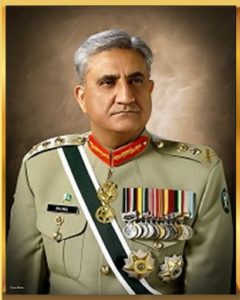
May 24, 2018 Observer Research Foundation
By Harsh Kakkar
Pakistan’s army chief, General Qamar Javed Bajwa, had recently stated, during the passing out parade at the Pakistan Military Academy, that “it is our sincere belief that the route to peaceful resolution of Indo-Pak disputes, including the core issues of Kashmir, can be found through comprehensive and meaningful dialogue”. He added, “while such dialogue is no favour to any party, it remains the inevitable precursor to peace across the region. Pakistan remains committed to such a dialogue, but only on the basis of sovereign equality, dignity and honour.”
This is the second time that he has made such a statement. The first was when he addressed the senate in December last year. On that occasion, he stated, “the military is ready to back political leadership’s initiative for normalisation of relations with India.”
Addressing a group of visiting South Asian journalists, Pakistan’s army spokesperson, General Ghafoor, echoed their chief’s words, stating that the army is ready to formally inject itself into any dialogue process with India. He went on to state that there was a trust deficit between the two countries and the time had come to move forward. He stated that the SAARC could be the most effective forum, if it could be revived. Pakistan has been raising the SAARC bogey recently, as the organisation remains in cold storage since India, supported by close allies, refused to attend the meet in Islamabad in 2016. Gen. Ghafoor’s words matching those of his chief, were aimed at conveying the message, hoping India takes the first step.
The Pakistan army has been blaming India for all their ills, whether it is their homegrown terror group, TTP, uprising in Baluchistan and FATA or the current US approach to them. Even the rising PTM movement, though peaceful, is being accused of India backing. For them, Indian presence in Afghanistan is an anathema. They have never shown any change in outlook towards India, whether it be reducing support to international terrorists who head anti-India groups, reducing infiltration, ceasefire violations or controlling funding to the Hurriyat.
General Bajwa’s comment that such a dialogue can only be on the basis of dignity and honour is laid bare by the simultaneous anti-India actions. India’s stand has not wavered since Modi undertook the Lahore visit and was rewarded by Pathankot. India has stood by its statement that ‘talks and terror’ cannot go hand in hand. India would remain adamant and it can afford to.
Pakistan on the other hand is facing an increased threat from the rapidly growing PTM movement and unending TTP attacks. In addition is the poor state of its economy, push by China to resolve its issues with India, growing conventional disparity and increasing Indian footprint in Afghanistan. Indian refusal to join the Belt Road Initiative (BRI) reduces income to the CPEC, adding to Pakistan’s economic deficits. International pressure continues to mount on Pakistan to do more against terror groups and resolve issues with India. Therefore, India remains on strong ground.
Over the years, India too has continuously been making errors in its foreign policy approach. First, it has always engaged the Pakistan civilian leadership, hoping it would reign in the deep state. This has never happened, the result being a terror strike, every time some progress appears on the horizon. Second, while every nation engages the Pakistan army chief, aware that he holds all the cards, India ignores him. The reason for India ignoring him is possibly avoiding giving similar importance to its own army chief.
Third, India has always adopted a civilian dominated foreign policy, ignoring military diplomacy. Thus, the true seat of power in Pakistan has never been interacted with nor addressed. Enabling military delegations to meet at a neutral venue enhancing military to military contacts may break the deadlock between the two countries. However, bureaucrats fearing success in military diplomacy would prefer marring relations with Pakistan, rather than risking it.
In the present instance, the government has failed to realise that both General Bajwa and Indian Army chief General Bipin Rawat had served simultaneously in the same mission in Congo. While General Rawat commanded the North Kivu Brigade, General Bajwa commanded the South Kivu Brigade. Both were under India’s ex-army chief, General Bikram Singh, and hence would know one another.
India is being cautious as it has been bitten by Pakistan on multiple occasions. Further, with elections due in 2019, any attempts to initiate dialogue with Pakistan, if countered by a terror strike, would impact the standing of the present government and be exploited by the opposition. Therefore, it has not commented on the offer of the Pakistan army chief. The offer did receive support from the local parties of Jammu and Kashmir — PDP and NC leadership. While the two NSAs remain in contact, there has been no further progress.
Such an action would have conveyed the message that its intentions are genuine, compelling India to take note. On the contrary, the first few days of Ramadan witnessed heightened ceasefire violations leading to civilian casualties on both sides.
Pakistan must enhance mutual confidence, as India impacted by past experiences, is unwilling to accept mere words, even if they flow from their army chief. Unless there are positive indicators from Pakistan, nothing would change. India would continue to rise economically, while Pakistan would flounder. India can afford to enhance military power, while Pakistan can only do so at the risk of further harming its economy. Thus, India would always remain in the driver’s seat.
